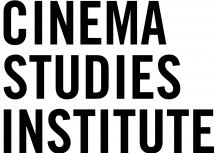CFP: Formations 2026 Annual Graduate Student Conference
2026 Annual Graduate Student Conference
Cinema Studies Institute, University of Toronto
March 6th to 7th, 2026
Keynote Speaker: Prof. Jodie Mack, Dartmouth College
Call for Papers: Formations
The Cinema Studies Graduate Student Union at the University of Toronto is pleased to announce that the 2026 Graduate Student Conference will take place at the Cinema Studies Institute from March 6–7, 2026. This year’s theme is “Formations,” and we are delighted to have experimental artist Jodie Mack, Professor of Film and Media Studies at Dartmouth College, as our keynote speaker.
In Aesthetic Theory (1970), Adorno writes that “In no artwork is the element of spirit something that exists; rather, it is something in a process of development and formation.” As the moving image continues to morph and migrate, it becomes ever more important to understand how we relate not only to the objects and patterns we study, in their material and aesthetic modes, but also to the heterogeneous political and social formations in which we are embedded. Thus, we seek submissions that attempt to address the various formations that confront us as cinema and media scholars today.
There are the broadly physical, and increasingly heterogeneous, forms through which moving images are produced, exhibited, distributed, and circulated. There are considerations of form and formalism, such as those catalogued in Eugenie Brinkema’s Life-Destroying Diagrams (2022), from her own radical formalism to the Russian formalism of the early twentieth century and the neo-formalism of David Bordwell and Kristin Thompson. There are discursive formations, what Foucault (1972) describes as systems of “dispersion” that exist between “objects, types of statement, concepts, or thematic choices.” There is also the mutual imbrication of cultural and economic formations, incisively theorized by Fredric Jameson. In practice, the emergence of counter-cinematic movements such as Third Cinema and Fourth Cinema lays bare the linkages between social formations and the continual remaking of film form. Similarly, queer theoretical approaches turn to negation to advocate for resisting heteronormative social formations (Lee Edelman, Jack Halberstam) or as an initial step towards conceptualizing alternate modes of community formation (Leo Bersani, José Esteban Muñoz). Moreover, posthumanist scholarship in the context of the Anthropocene (Jaime del Val) presses us to think through formlessness. Finally, the formations of knowledge that organize disciplinary regimes in the humanities, such as area studies, are themselves products of specific geopolitical conditions and institutional histories. As Harry Harootunian observes in History’s Disquiet (2000), “the systematic formation of area studies in the major universities was a massive attempt to relocate the enemy in the new configuration of the Cold War,” a provocation to examine the role of North Atlantic academic institutions in maintaining hegemonic geopolitical formations.
The above is not meant to be exhaustive. In considering the theme “Formations,” we ask scholars to reflect on the forms and objects that most concern them today. How do we constitute the forms and objects of our study? How do these forms and formations relate to each other? If, as Deleuze (1989) writes, “it is at the level of the interference of many practices that things happen: beings, images, concepts, all the kinds of events,” then it is imperative that we contend with the processes by which our heterogeneous pursuits are formed and sustained.
Sample topics might include but are not limited to:
- Abstraction
- Aesthetic forms and formalism
- Assemblages, assembly, montage
- Film theory
- Film-historical formations, movements, new waves, generations
- Film distribution, exhibition, circulation
- Formlessness
- Information technology, media theory
- Marxist theory
- Process and process genres
- Queer Theory
- Social, subject, state formations
- Materiality, medium-specificity
- Third Cinema, Fourth Cinema
We welcome submissions from independent scholars and graduate students worldwide. Applicants must submit a brief abstract (300-500 words) and a bio (50-100 words) to csgraduatestudentunion@gmail.com by December 5, 2025, 11:59 pm EST. Conference acceptances will be sent out by the end of January.
Submissions should provide the following information:
- Name & pronouns
- Level of study and name of institution (if applicable)
- Title
- Abstract
- Bio
- 3-5 item bibliography
Archives
Membership Services / Adhésion
To join or renew with FMSAC, please click here to access Membership Services.
Pour se joindre à l'ACÉCM ou pour renouveler votre adhésion, cliquez ici pour accéder aux services aux membres.
For more information about membership benefits, click here.
Pour plus d'informations sur des avantages d'adhésion, cliquez ici.











